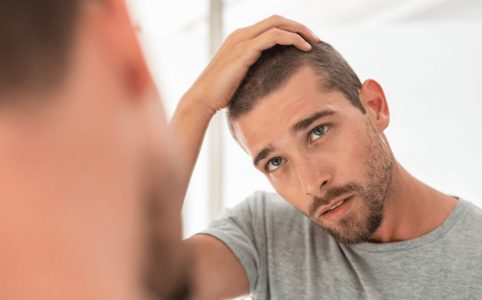Revolutionary new study offers a glimmer of hope for Aussie men battling hair loss!
- Replies 0
We understand how personal and confidence-shaking hair loss can be for many men. But fear not, there might be a surprising solution on the horizon.
Recent studies have revealed that a staggering number of Australian men are affected by significant hair loss. By the time they reach their 40s, almost half have experienced a substantial loss of hair.
Fortunately, a study has uncovered a glimmer of hope for those battling the baldness blues. According to an article in the New York Post, researchers have stumbled upon a remarkable discovery: hairy moles could potentially be the key to promoting thick and luxurious locks.
Who would have thought?

Here's the science behind it.
The researchers at the University of California Irvine found out that osteopontin, a molecule lounging in hairy moles, can awaken dormant stem cells in tiny hair follicles. The result? The growth of impressively long, thick strands of hair!
However, if osteopontin has the ability to stimulate stem cells and induces the growth of thick hair on moles, could it not also be used to promote the growth of thick and luxurious hair on human heads?
This possibility is being considered by Maksim Plikus, a professor of developmental and cell biology at UCI.
Professor Plikus expressed his thoughts on the matter, stating, 'Nature essentially performed the most important experiment for us already: In millions of people, there are hairy moles that have increased osteopontin.'
In another interview he further explained, 'I see what we did as reverse-engineering nature's experiment, and for this reason, I'm pretty excited that osteopontin really could be relevant to hair loss therapy.'
Osteopontin isn't exactly a newcomer to the medical scene. For years, scientists have recognised the crucial role of osteopontin in various bodily processes such as wound healing, tissue remodelling, and the prevention of bone mineralisation. However, its contribution to hair growth has remained largely overlooked.
Hair loss, medically referred to as androgenetic alopecia, affects a significant portion of the population, up to 50 per cent of both men and women. Despite its prevalence, only a few treatments have been approved for this condition.
Among the approved treatments are Rogaine (minoxidil), Propecia (finasteride), and Aldactone (spironolactone), which have demonstrated efficacy for some individuals experiencing hair loss. However, these medications do not yet produce satisfactory results for everyone affected.
The pharmaceutical industry has not placed a high priority on developing solutions to reverse hair loss. As a result, research efforts in this area have been limited, and effective pharmaceutical interventions for hair loss have been lacking.
'You don't really die from hair loss, so it's been underestimated,' Professor Plikus said.
Professor Plikus and his team are gearing up for an exciting milestone in the next few months: clinical human trials. Their experiments on mice and human skin samples have shown promising results, paving the way for this crucial next step.
The upcoming trials will involve injecting hair-growing proteins, including osteopontin, into the scalp. To administer these injections, microneedles similar to the ones used in Botox treatments will be used.
Professor Plikus, who is not only leading the research but also a co-founder of Amplifica, a San Diego-based start-up conducting the trials, is optimistic. He believes this groundbreaking research will provide valuable insights and propel us closer to unlocking effective hair growth solutions.

On behalf of everyone at the Seniors Discount Club, we want to send our warmest wishes to the researchers embarking on this groundbreaking study. We'll be eagerly keeping up with the progress they make.
So, what do you think? Are you excited about these incredible advancements in the realm of hair loss? Don't hesitate to share your thoughts in the comments below!
Recent studies have revealed that a staggering number of Australian men are affected by significant hair loss. By the time they reach their 40s, almost half have experienced a substantial loss of hair.
Fortunately, a study has uncovered a glimmer of hope for those battling the baldness blues. According to an article in the New York Post, researchers have stumbled upon a remarkable discovery: hairy moles could potentially be the key to promoting thick and luxurious locks.
Who would have thought?

Millions of Aussie men are affected by significant hair loss, but a new study has given hope to those who are affected. Credit: Shutterstock.
Here's the science behind it.
The researchers at the University of California Irvine found out that osteopontin, a molecule lounging in hairy moles, can awaken dormant stem cells in tiny hair follicles. The result? The growth of impressively long, thick strands of hair!
However, if osteopontin has the ability to stimulate stem cells and induces the growth of thick hair on moles, could it not also be used to promote the growth of thick and luxurious hair on human heads?
This possibility is being considered by Maksim Plikus, a professor of developmental and cell biology at UCI.
Professor Plikus expressed his thoughts on the matter, stating, 'Nature essentially performed the most important experiment for us already: In millions of people, there are hairy moles that have increased osteopontin.'
In another interview he further explained, 'I see what we did as reverse-engineering nature's experiment, and for this reason, I'm pretty excited that osteopontin really could be relevant to hair loss therapy.'
Osteopontin isn't exactly a newcomer to the medical scene. For years, scientists have recognised the crucial role of osteopontin in various bodily processes such as wound healing, tissue remodelling, and the prevention of bone mineralisation. However, its contribution to hair growth has remained largely overlooked.
Hair loss, medically referred to as androgenetic alopecia, affects a significant portion of the population, up to 50 per cent of both men and women. Despite its prevalence, only a few treatments have been approved for this condition.
Among the approved treatments are Rogaine (minoxidil), Propecia (finasteride), and Aldactone (spironolactone), which have demonstrated efficacy for some individuals experiencing hair loss. However, these medications do not yet produce satisfactory results for everyone affected.
The pharmaceutical industry has not placed a high priority on developing solutions to reverse hair loss. As a result, research efforts in this area have been limited, and effective pharmaceutical interventions for hair loss have been lacking.
'You don't really die from hair loss, so it's been underestimated,' Professor Plikus said.
Professor Plikus and his team are gearing up for an exciting milestone in the next few months: clinical human trials. Their experiments on mice and human skin samples have shown promising results, paving the way for this crucial next step.
The upcoming trials will involve injecting hair-growing proteins, including osteopontin, into the scalp. To administer these injections, microneedles similar to the ones used in Botox treatments will be used.
Professor Plikus, who is not only leading the research but also a co-founder of Amplifica, a San Diego-based start-up conducting the trials, is optimistic. He believes this groundbreaking research will provide valuable insights and propel us closer to unlocking effective hair growth solutions.
Key Takeaways
- Millions of Australian men affected by hair loss could find hope in a new study.
- Researchers found that a molecule called osteopontin, found in hairy moles, can promote the growth of thick hair.
- The team, headed by Professor Maksim Plikus, has achieved encouraging results in mouse experiments and with human skin samples and is planning to commence clinical trials in humans.
On behalf of everyone at the Seniors Discount Club, we want to send our warmest wishes to the researchers embarking on this groundbreaking study. We'll be eagerly keeping up with the progress they make.
So, what do you think? Are you excited about these incredible advancements in the realm of hair loss? Don't hesitate to share your thoughts in the comments below!







